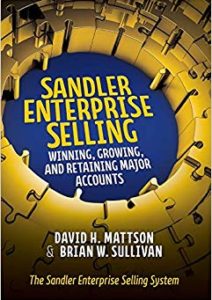Landing a large enterprise account is a big achievement, bringing with it new revenue and profit. But unlike smaller account wins, the real significance of an enterprise account victory is the huge potential for growth.
Enterprise pursuits can be challenging with their complex buyer networks, long pursuits, formidable competitors and other frustrations, demanding that selling teams be their very best. And the investments of money, people, time and energy only add to the stakes. But for effective selling and delivery organizations, the payoff is huge. Because enterprise accounts are marketplaces in and of themselves – vast, teeming fields of rich, moist, fertile soil that await seeds of growth. And with the business won, your ability to deliver with excellence sets the stage for planting those seeds. But how do you make it happen? And how do you focus on quality delivery and account expansion, doing both well at the same time?
First, you must understand and execute the true teaming of sales and delivery. The dreaded hand-off, “detaching with an ax,” is simply unworkable with enterprise accounts. Just as involving delivery team members in sales pursuits increases the likelihood of wins, the continued engagement of sales with delivery breeds growth. This continuous process of sales and delivery feeds streams of transactions over time in long-term account relationships. That’s the enterprise world.
This teaming is not a different strategy than a service excellence focus, but an enhancement of it. For proven delivery success is the bedrock of account expansion. Without it, you haven’t earned the right to seek account growth and there will be precious few opportunities for it. Without high quality delivery, the business relationship itself will be a legitimate concern.
But with demonstrated delivery excellence setting the stage, an account growth framework to follow is critical. In Sandler Enterprise Selling, we focus on five account growth paths – Organic Growth, Partnerships and Alliances, Family Tree, Alumni and Customer’s Customer. Of course, there are others to consider but these five are fundamental.
Organic Growth is the channel that most selling organizations implement – some quite well. Not all, though, as those promoting the exit of the sales team once the business is won are challenged with even this fundamental growth channel – the extension or renewal of an existing piece of business and its expansion in the area currently served and into other account areas. Organic Growth also guides the selling of other products or services from the selling organization’s portfolio to the multiple areas in the enterprise account. Simply put, it’s is going deep and wide in the account and in your product/service portfolio.
Next is Partnerships and Alliances. In winning enterprise deals, you often partner with allies who enhance your solution. And when you’re actually delivering, you meet and interact with other firms doing the same. In either co-bidding or co-delivering, these connections create fertile opportunities. But you must be proactive to grow them into mutual victories with other accounts by planning for and with your partners.
We then work the Family Tree. Enterprise accounts represent ecosystems of opportunity through their extended networks. Parents, subsidiaries and sister companies are all potentially fruitful prospects. And your track record of successful delivery is the springboard to those connected prospects. Think about it. If you’re serving NetJets, the aviation leasing firm, why might you have possible opportunities with Fruit of the Loom, the apparel firm? Or Geico, the insurer or Dairy Queen, the ice cream chain? Why? Because they’re all Berkshire-Hathaway companies, family members, if you will. Of course, though, Dairy Queen would never beg you to work them simply because Geico is your client. It’s just not going to happen. But the connection adds warmth and credibility to the contact. And that’s a promising start.
In enterprise accounts, decision-makers and contacts come and go. The Alumni channel helps you proactively follow those who exit, potentially opening new doors for you where they land. And once you’ve proven your organization’s capabilities to the new contacts who’ve entered, how about seeking their guidance regarding potentially serving their ex-employers? Yes, it takes work. But again, adding warmth to the reaches is huge.
The fifth channel is Customer’s Customer. In serving enterprise accounts, you often interact directly with their clients, the end customers for whom your work delivers direct benefit. What about having your customer’s customers, firms already familiar with the quality of your work, as your clients as well?
Of course, common sense must drive your strategy and actions. Respect and communication dictate that you never randomly contact your client’s customers without permission. Be smart, though, and odds are your client will be supportive and actually help you win business.
In the end, your mindset must be that account expansion is nothing less than your obligation. Because you owe it to your organization and to yourself as the tangible rewards of growth benefit you both. Most importantly, though, you owe it to your enterprise account. They selected you, investing in you as their partner. For you to neglect seeking every possible way to deliver additional value would be doing them a great disservice. Internalize that mindset, follow the framework and grow!
Pipeliner CRM empowers salespeople to grow enterprise accounts. Get your free trial of Pipeliner CRM now.











Comments (1)
I have been reading out many of your blog and I can state clever stuff. I will definitely bookmark your site. – Data Cleansing Services, List Building Services
http://leadgenerationservices.com.au/data-cleansing-and-list-building.html